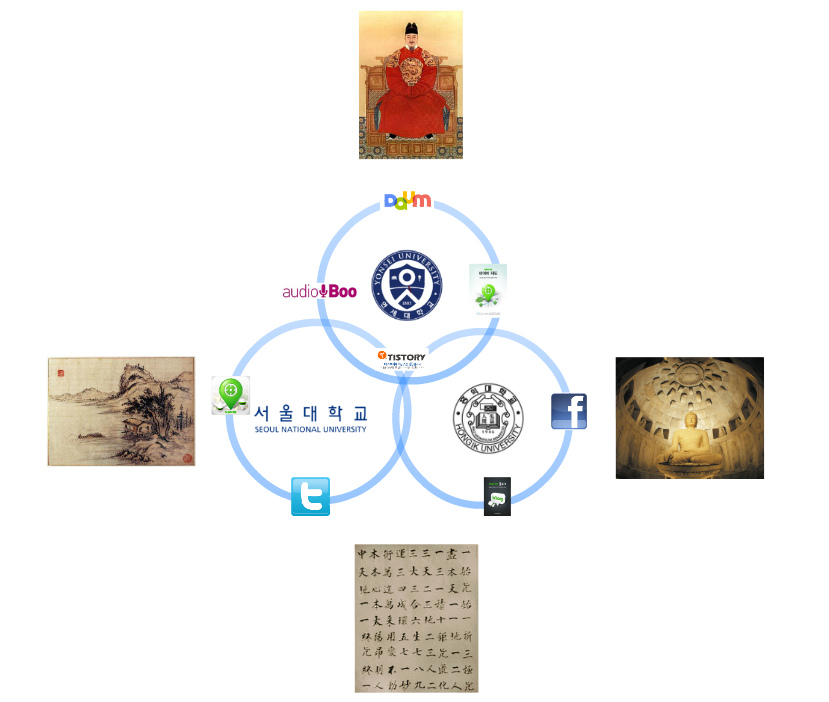
A potential activity system for mobile learning for Humanities in higher education in Korea
I have spent the last week or so working through my feedback from my supervisors, much of which has caused me to rework my original research proposal. I wrote about this problem I had with serving two masters last week, so this time around I wanted to focus on how the research proposal is beginning to reconfigure itself. After much reflection, it is starting to look like I might move away from a developing nations focus towards one that can support the sort of multimodal activity I am looking to enhance. This will involve mobile technology that supports multimodal knowledge construction and reflection, more than likely tablet and smartphone technology (although none of that has been decided yet).
I have reconfigured my focus slightly (just broadened it a bit) to the Humanities. My focus now is on understanding disciplinary practice in the Humanities as systems of overlapping activity where
- knowledge is socially constructed
- participants must navigate through the disciplinary artefacts, practices, signs, symbols, and learn to work with them (and have them work on them). In short, they must be open to the idea of mediation, both mediating meaning through artefacts and being mediated by them.
- social relationships (especially the peer support and apprentice/mentor relationships) are of critical importance in the ‘centering’ process of moving from the peripheries of expertise (apprentice) towards the center of expert authority. This social process is quite useful in thinking of disciplinary practice as a social practice of engagement with the domain and the community.
- knowledge representation can be multimodal; the transduction involved in switching between and aggregating across modes provides a rich environment for both expression (creator/artist/student) and assessment (faculty).
- mobile and online learning environments place greater emphasis on learner as creator (or at least co-creator); the role of the artist in dealing with Humanities practice in mobile environments is a useful repositioning of the learner.
So my new focus (and the image should give this away) is on Korea as a particularly active community in the Humanities in higher education, one with incredible access to mobile technology, and a fairly active participatory culture. So, this research is focusing on the following:
- accelerating the production and dissemination of multimodal knowledge representations or simply multimodal modes of communication (interpreting an image sent to the mobile community; responding with a video, audio, or a geopositioned drawing, etc.) in select Korea universities.
- developing a social system for this communication around the Humanities that addresses need (as defined by community, but examples might include research, knowledge sharing, writing, collaboration), domain (disciplinary practice), and dissemination (publishing professionally or through a blog, etc.)
- augmenting existing peer support and mentor/apprentice relationships (any technological intervention, mobile or otherwise, that does not augment a social relationship as much as a disciplinary practice is missing the point). This could be something as simple as a button that provides the options of Share to Group and Share to Supervisor. It won’t be as simple as that, but that is a good place to start.
So there you have it. Considerable reworking of the existing research proposal. I am even providing a cursory analysis of the Humanities community needs (as run through Lave & Wenger’s Community of Practice). This type of (simplistically) visual analysis helps reconfigure the discipline as a set of systems mediated by need, tradition, domain, and social motivation. I won’t focus on more than one or two of these needs but it helps to begin from understanding what they are in the Korean context.
| Need | Goal or Activity |
| Problem Solving | Access to research subjects, best practice, administrative concerns, professional participation, content (lesson plans, pedagogical, content, mediation, etc.) |
| Request for Information | Research (constructing search queries, evaluating sources), appeals to community for information |
| Seeking authority | Mediation, citations, research, peer review, supervisor evaluation |
| Reuse (content, practice, research, tools) | Referencing existing data or research, repurposing research design, |
| Coordination and synergy | Collaborative research projects, cross-organization collaboration, interdisciplinary research, curriculum design |
| Discussion | Collaborative discussion at conferences, online, through social media, discussion boards, listservs, etc. |
| Evaluation/Publication | Community review, peer review, publication review |
| Mapping knowledge, synergy, archiving, accessing | Data management, (multimodal) data collection, storage, archiving |
| Relationship-based | Mentorship/apprentice role, relationship to university, relationship to department, relationship to profession, relationship to peer support group |
